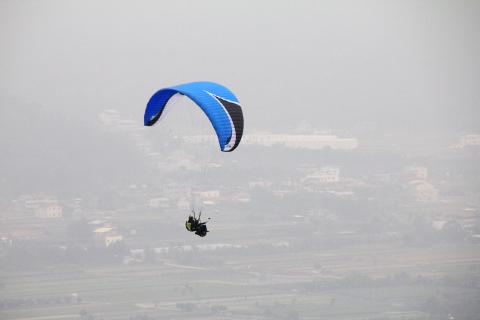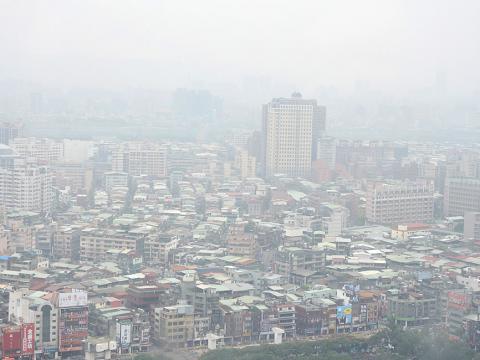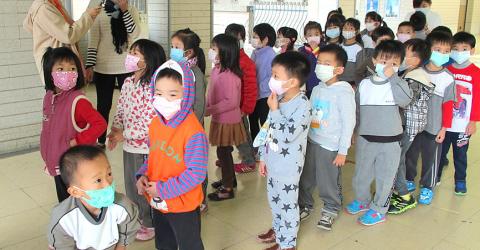The air quality in western parts of the nation yesterday reached an unhealthy level, with the index for fine particulate matter smaller than 2.5 micrometers (PM2.5) hitting hazardously high levels, the Environmental Protection Administration (EPA) said.
Except for Hualien and Taitung counties, other parts of Taiwan saw hazardous air quality levels, with most of the EPA’s monitoring stations in western Taiwan yesterday morning recording a level of 10 on the 1 to 10 PM2.5 index.
Level 10 on the index represents a PM2.5 concentration of 71 micrograms per cubic meter or above. Measurements above level 7 on the index (54 to 58 micrograms per cubic meter) are considered severe enough to cause tangible discomfort and health problems.

Photo: Tung Chen-kuo, Taipei Times
The poor air quality was attributed to a cold air front moving into Taiwan from the northwest that brought with it pollutants from China, the EPA said.
The air quality was expected to improve in northern Taiwan, beginning yesterday afternoon, but remain poor in the center and the south for a few more days because of local pollutants from factories and a lack of conditions enabling the pollutants to disperse, it said.
A coal-fired unit at the Taichung Power Plant was shut down Tuesday night in a bid to reduce pollutants, the agency said.

Photo: Lai Hsiao-tung, Taipei Times
The EPA reiterated its advice that the elderly and those with chronic lung problems or heart disease should avoid prolonged outdoor activity while the PM2.5 index is so high, and that everyone should wear facial masks outside.

Photo: CNA

Intelligence agents have recorded 510,000 instances of “controversial information” being spread online by the Chinese Communist Party (CCP) so far this year, the National Security Bureau (NSB) said in a report yesterday, as it warned of artificial intelligence (AI) being employed to generate destabilizing misinformation. The bureau submitted a written report to the Legislative Yuan in preparation for National Security Bureau Director-General Tsai Ming-yen’s (蔡明彥) appearance before the Foreign Affairs and National Defense Committee today. The CCP has been using cognitive warfare to divide Taiwanese society by commenting on controversial issues such as Taiwan Semiconductor Manufacturing Co’s (TSMC, 台積電) investments in the

INVESTIGATION: The case is the latest instance of a DPP figure being implicated in an espionage network accused of allegedly leaking information to Chinese intelligence Democratic Progressive Party (DPP) member Ho Jen-chieh (何仁傑) was detained and held incommunicado yesterday on suspicion of spying for China during his tenure as assistant to then-minister of foreign affairs Joseph Wu (吳釗燮). The Taipei District Prosecutors’ Office said Ho was implicated during its investigation into alleged spying activities by former Presidential Office consultant Wu Shang-yu (吳尚雨). Prosecutors said there is reason to believe Ho breached the National Security Act (國家安全法) by leaking classified Ministry of Foreign Affairs information to Chinese intelligence. Following interrogation, prosecutors petitioned the Taipei District Court to detain Ho, citing concerns over potential collusion or tampering of evidence. The

‘COMPREHENSIVE PLAN’: Lin Chia-lung said that the government was ready to talk about a variety of issues, including investment in and purchases from the US The National Stabilization Fund (NSF) yesterday announced that it would step in to staunch stock market losses for the ninth time in the nation’s history. An NSF board meeting, originally scheduled for Monday next week, was moved to yesterday after stocks plummeted in the wake of US President Donald Trump’s announcement of 32 percent tariffs on Taiwan on Wednesday last week. Board members voted to support the stock market with the NT$500 billion (US$15.15 billion) fund, with injections of funds to begin as soon as today. The NSF in 2000 injected NT$120 billion to stabilize stocks, the most ever. The lowest amount it

NEGOTIATIONS: Taiwan has good relations with Washington and the outlook for the negotiations looks promising, Minister of Economic Affairs J.W. Kuo said Taiwan’s GDP growth this year is expected to decrease by 0.43 to 1.61 percentage points due to the effects of US tariffs, National Development Council (NDC) Minister Paul Liu (劉鏡清) said at a meeting of the legislature’s Economics Committee in Taipei yesterday, citing a preliminary estimate by a private research institution. Taiwan’s economy would be significantly affected by the 32 percent “reciprocal” tariffs slapped by the US, which took effect yesterday, Liu said, adding that GDP growth could fall below 3 percent and potentially even dip below 2 percent to 1.53 percent this year. The council has commissioned another institution